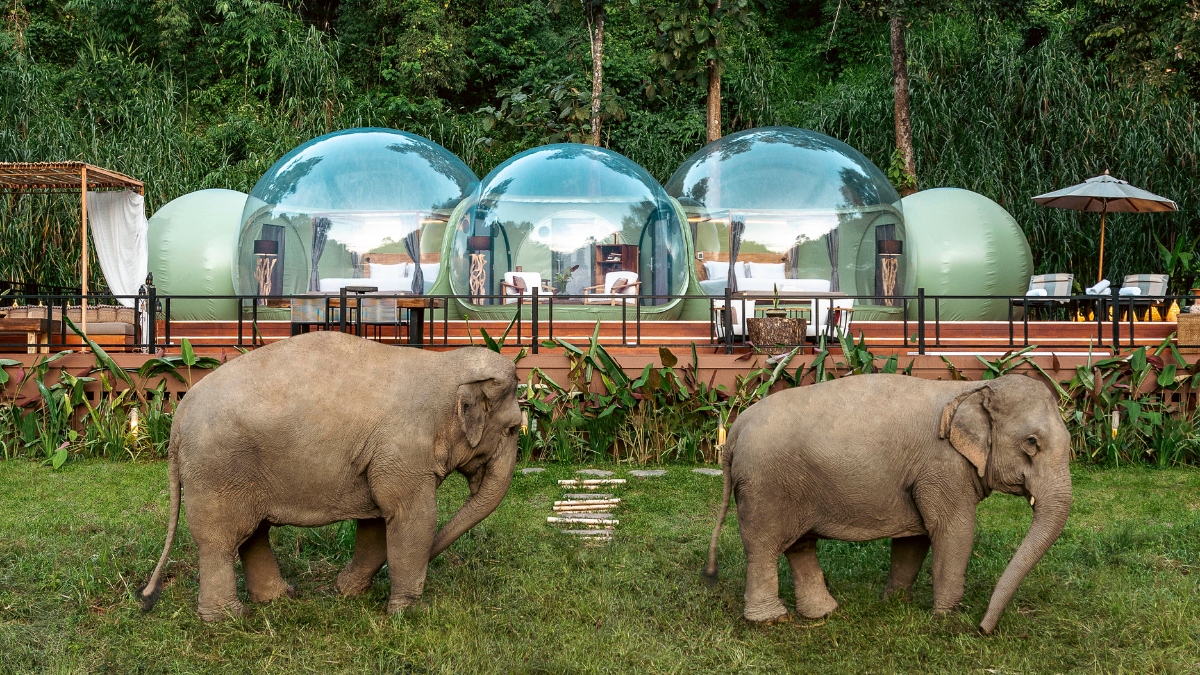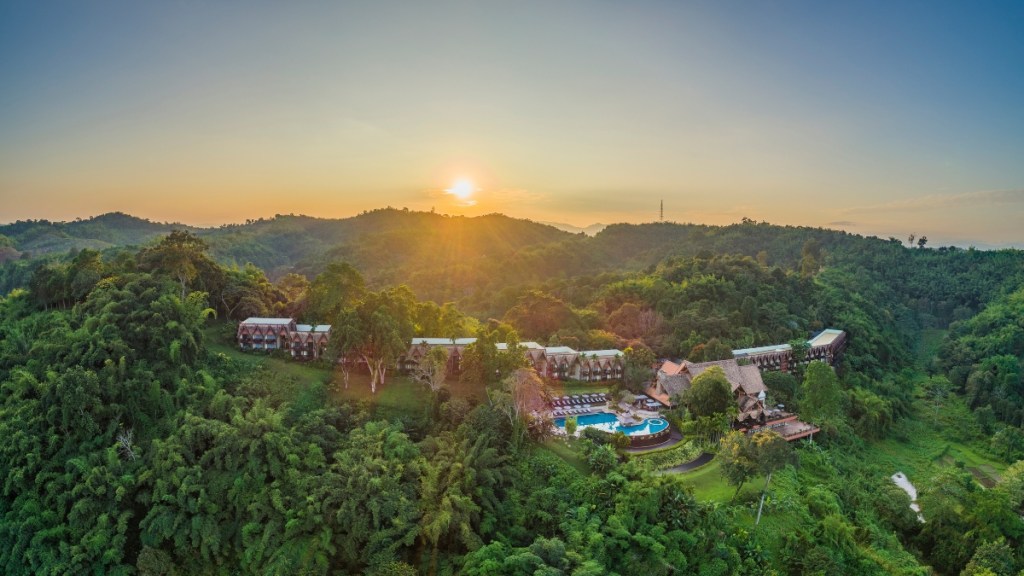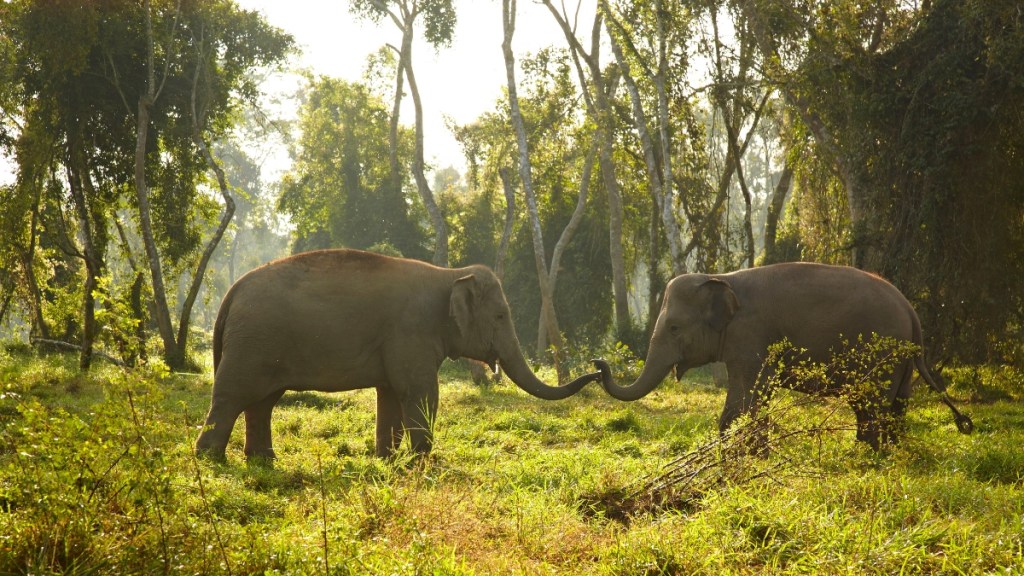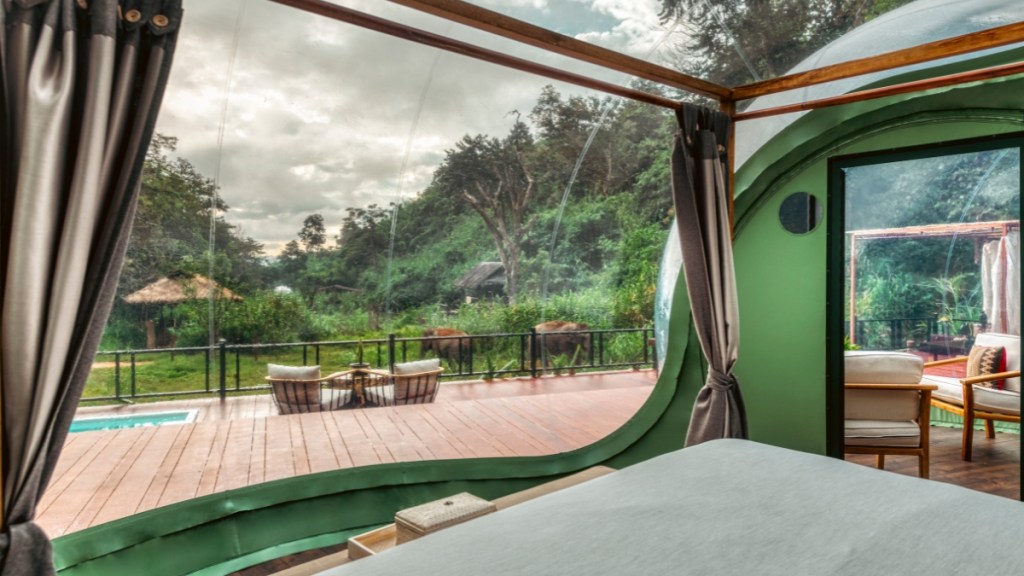
My date has awful manners. She’s arrived covered in dirt, scoffed her dinner without pause and, worst of all, brought her best friend along. None of which has prevented me from falling in love.
I’m sipping a frosty Chang beer while two Asian elephants, named Jahthong and Kummoon, dine on sugarcane with their great grey rumps facing me. As the pair get stuck into their meal, somewhere behind I can hear the clang and sizzle of my chef cooking up a three-course dinner.
My new wrinkly friends aren’t much for conversation, so instead I watch as dusk takes hold of the jungle. The falling sun shimmers through the smoky haze that hangs over the Thai border.
Just beyond the trees is the infamous Golden Triangle – the intersection where Myanmar, Thailand and Laos come together to drink from the mighty Mekong River. The luminous nickname has a dark edge to it, a nod to the region’s history of wildlife trafficking and opium production, which persists today in some areas.
I’m imagining poachers stalking through the forest when my entrée arrives: A sweet and sour Thai beef salad wrapped like a taco in a betel leaf alongside a platter of treats including satay skewers.
Thankfully, much of the Golden Triangle’s illegal activities have been disbanded and the region is reimagining itself as a luxury tourism destination. Premium hotels have sprung up beside the Mekong River and an extravagant casino built on the Laos border attracts Chinese tourists.
I haven’t come here to splash cash, though. A four-hour drive from Chiang Mai has brought me to Anantara’s Golden Triangle Elephant Camp and Resort, which is perched on a ridge overlooking 65 hectares of bamboo forest.
I arrived in time to find a parade of elephants scattered along the river far below, attended to by their watchful mahouts.
The resort is expansive, with an impressively large pool, day spa, restaurant, bar and shop, but it’s only a fraction of the property. The rest has been set aside as a retirement village for elephants.

The sun sets over the Anantara Golden Triangle Resort in northern Thailand.
Elephants have been broken in and used for war, ceremonies and manual labour for more than 4000 years, but mahout families, who traditionally own elephants, pivoted to tourism in the 1990s.
Glossy travel brochures promised families exciting elephant rides and school children were thrilled as elephants reared up and dropped them into rivers like a living water slide.
Elephant tourism was lucrative and quickly exploded. Only in recent years have awareness campaigns started highlighting the cruel treatment elephants endure to please tourists.
Ending animal cruelty is a noble cause but stopping it suddenly would also deprive locals of their income.
To resolve this, Anantara has loaned elephants from mahout families in the Golden Triangle, in a deal that allows families to keep their source of income while removing elephants from harmful tourism practices.
Elephants that have been abandoned or are too old to work are also taken in. Here, they are given room to roam and interact with each other while conservationists and vets study them.

Some of the permanent residents at Anantara Resort Golden Triangle.
There’s also a range of opportunities for guests to get up close with the elephants, including preparing medicinal food for them to eat, and accompanying them on early morning walks along the river.
The star attraction is undoubtedly a night with the elephants, sleeping beneath the stars in one of Anantara’s clear PVC domes, called Jungle Bubbles.
The reflective bubbles are gleaming in the sunlight and the hot tub on the deck is bubbling away when the jeep drops me off for the evening.
My chef greets me with a beer just as Jahthong and Kummoon are being led into the large, enclosed pen in front of my dome. It actually comprises three connected bubbles: One houses a king bed that looks out over the paddock and forest, another is a seated living room, and the last contains a shielded ensuite shower and toilet.
It’s properly dark by the time my main arrives, a sophisticated khao soi that hums with lime and chilli. I slurp down the crunchy noodle soup while watching stars pop into the sky above. The chef heads off soon after, leaving me with my elephant friends in the soft glow of lamplight.
As the pressing humidity of the day dissipates, Jahthong and Kummoon lay down and cuddle each other to sleep. I follow suit and turn in for the night, lying in bed and gazing up at the stars through my bubbled ceiling.
I don’t realise I’ve fallen asleep until I’m jolted awake by Jahthong’s trumpeting at 4am. My heart races, until I remember where I am and fall back to sleep.

Transparent walls offer a clear view of the neighbours without having to get out of bed.
With no curtains to keep out the early sun, I wake up at dawn and immediately head out onto the deck to say good morning to my camp mates.
I’m just in time to wave them off as their mahouts collect them, ready for another walk along the thundering Mekong.
The writer travelled as a guest of Anantara and the Tourism Authority of Thailand